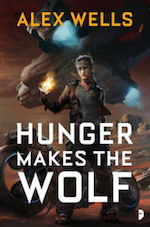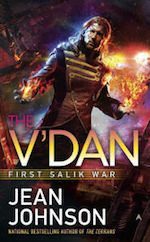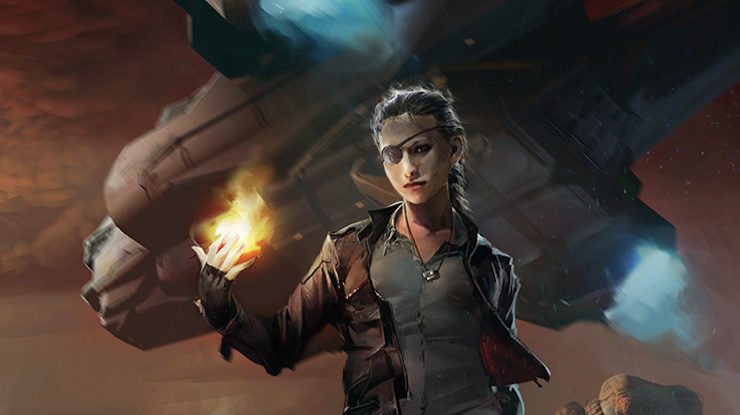Friends, I bring you good news. Do you find your lives lacking in excitement? Does your reading lack outcast mercenary biker gangs led by one-eyed sorcerers, racing across the trackless deserts of a company-owned mining planet to stick it to The Man and make a profit? Do you feel that science fiction has an insufficiency of (a) weird planets and (b) trains and (c) witchy powers caused by exposure to weird planets? Do you think that science fiction needs more labour organising alongside its daring capers, prison/lab cell breakouts, explosions, subversive political activity, and people with strange powers?
If you do, friends, then you’re in luck. Because Alex Wells’ debut novel Hunger Makes the Wolf includes all these things along with a good helping of friendship between women, great pacing, a tense plot, and an explosive conclusion.
(Let me repeat the phrases outcast mercenary biker gang and organised labour for emphasis.)
 Hunger Makes the Wolf is a marvellously atmospheric book. It’s set on a planet called Tanagawa’s World, which is owned by TransRift Inc., the company that owns the monopoly on FTL travel. Hunger Makes the Wolf does deserts and mining towns and exploitative corporate business practices with verve and aplomb, and then ups the weird and cool factor significantly by including biker mercenaries and a strange figure in the desert called the Bone Collector who does what can only be described as magic (maybe it is alien science magic! who knows? it is cool) and can also turn to stone—and the weird and creepy figure of the Weatherman employed by the company who also has strange powers.
Hunger Makes the Wolf is a marvellously atmospheric book. It’s set on a planet called Tanagawa’s World, which is owned by TransRift Inc., the company that owns the monopoly on FTL travel. Hunger Makes the Wolf does deserts and mining towns and exploitative corporate business practices with verve and aplomb, and then ups the weird and cool factor significantly by including biker mercenaries and a strange figure in the desert called the Bone Collector who does what can only be described as magic (maybe it is alien science magic! who knows? it is cool) and can also turn to stone—and the weird and creepy figure of the Weatherman employed by the company who also has strange powers.
And I haven’t even mentioned Hob yet. Or Mag. They’re Hunger Makes the Wolf’s main characters, teenage friends reunited after a three-year estrangement. Hob is a one-eyed biker mercenary, on her second chance after a massive screw-up, hiding (badly) her ability to set things on fire with the power of her mind. Mag is a miner’s daughter with nothing left to lose after the company destroys her family, who ends up at the centre of a movement to organise cooperatively to oppose the murderous and exploitative practices of TransRift Inc.
But I think my favourite thing about Hunger Makes the Wolf is the trains. Some quirk of the planetary atmosphere means both electronics and atmospheric flight are twitchy on Tanagawa’s World. So there are trains, instead, and each town is fairly isolated, with communication to the outside world a difficult.
And then there’s the train job: among the many capers contained within this novel’s pages is one in which people on fast-moving motorbikes jump on and off trains in order to steal medical supplies. I’m a sucker for capers, and a well-done train job is basically the best fictional caper.
Reading Hunger Makes the Wolf, I found myself wistfully contemplating how visually amazing it could be translated to either the big or the small screen. It’s a science fiction Western thriller, and it is great, and I’m really, intensely, eagerly looking forward to the sequel. This is the sort of thing I really like. UP WITH THIS SORT OF THING.
 I’m a little less enthused about the second two books in Jean Johnson’s First Salik War trilogy, The V’Dan and The Blockade. While I’m a sucker for diplomat fish-out-of-water stories, these volumes, while passably entertaining, feel a little bit too much as though they’re painting by the numbers. The struggles that the Terrans have in convincing the V’Dan to take them seriously are heavy-handed as an allegory for modern race-based bigotry, and rather too simplistic; while the Terrans’ success at eradicating prejudice systematically worldwide on Earth—apart from prejudice against people with psi powers—feels… I don’t know. Almost disturbing in its ease? Disrespectful of how hard it actually is to overturn the structures that maintain oppression?
I’m a little less enthused about the second two books in Jean Johnson’s First Salik War trilogy, The V’Dan and The Blockade. While I’m a sucker for diplomat fish-out-of-water stories, these volumes, while passably entertaining, feel a little bit too much as though they’re painting by the numbers. The struggles that the Terrans have in convincing the V’Dan to take them seriously are heavy-handed as an allegory for modern race-based bigotry, and rather too simplistic; while the Terrans’ success at eradicating prejudice systematically worldwide on Earth—apart from prejudice against people with psi powers—feels… I don’t know. Almost disturbing in its ease? Disrespectful of how hard it actually is to overturn the structures that maintain oppression?
I don’t know. I don’t know why that continues to itch at me, long after I’ve forgotten the details of the plot and the politics and the space battles. Perhaps because the ease with which the Earth of Johnson’s fiction achieved her utopian vision contrasts very strongly with current (and historic) struggles to oppose oppressive and harmful policies.
Speaking of things that itch at me, my TBR pile is judging me silently from the corner. I’m looking forward to reading Nnedi Okorafor’s Binti: Home and Thoraiya Dyer’s Crossroads of Canopy and Michelle Sagara’s Grave and Cassandra Khaw’s Food of the Gods and Cynthia Ward’s The Adventure of the Incognita Countess and Yoon Ha Lee’s Raven Stratagem—for starters. What have you guys been reading lately that’s good, and what are you looking forward to reading next?
Liz Bourke is a cranky queer person who reads books. She holds a Ph.D in Classics from Trinity College, Dublin. Find her at her blog. Or her Twitter. She supports the work of the Irish Refugee Council and the Abortion Rights Campaign.











I just finished The Stars are Legion, enjoyed it but not as much as Hurley’s other work I’ve read. It has a sort of mythical resonance and feel in a SF context whereas I personally hoping for a bit more gritty realism (there’s plenty of grit, but it feels like a gritty take on an ancient myth with heroes whereas I wanted more average people in a wild space opera universe… to contrast, her Bel Dame series for example made me really buy into the characters as ordinary people in a messed up setting). Again, enjoyed it though, and maybe if I was in a certain type of mood it might be right what I was after.
Right now I seem to be in a bit of a reread cycle and out of new books, but I’m thinking of trying Mur Lafferty’s Six Wakes soon.
I’ll be trying Hunger Like a Wolf, trains, labour organising and magic sounds right up my street.
Hunger Makes the Wolf sounds great. I’ll have to give it a go.
Just put a library hold on the first book, thanks!
jump on and off trains in order to steal medical supplies
Isn’t this basically the plot of an episode of Firefly?